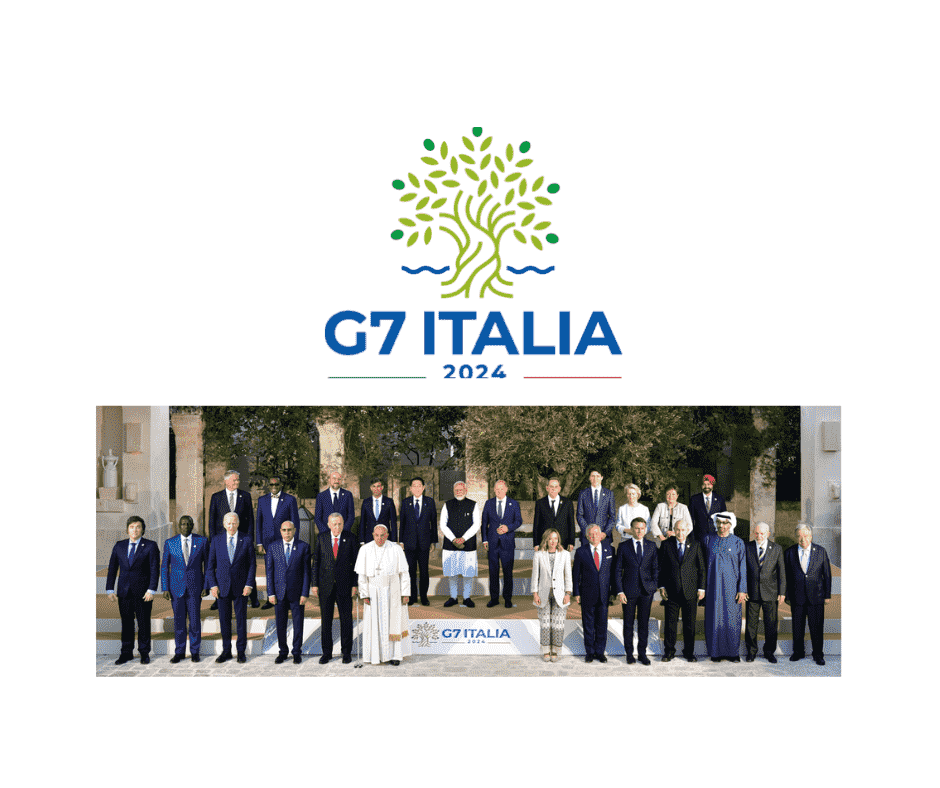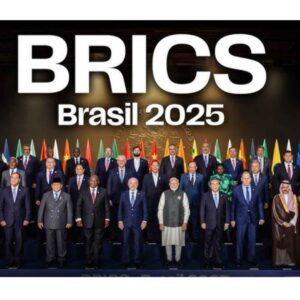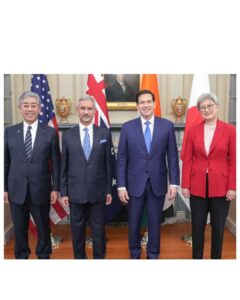
50TH G7 SUMMIT ITALY- 2024
Introduction
The Group of Seven, commonly known as the G7, is an influential coalition of the world’s advanced economies, including the United States, Canada, the United Kingdom, France, Germany, Italy, and Japan. The European Union is also represented in the group. Formed in the mid-1970s in response to the economic upheavals of that era, the G7 has evolved into a critical forum for coordinating economic policies, addressing global challenges, and promoting democratic values and human rights.
Born from economic turbulence in the 1970s, the G7 has become a vital forum where leaders meet to hammer out agreements on everything from trade and finance to climate change and international security. Their collective economic strength is immense, influencing markets and policies worldwide. But beyond economics, the G7 stands for democratic values, human rights, and the well-being of people around the globe.
Throughout its history, the G7 has been at the forefront of managing financial crises, promoting sustainable development, and fostering cooperation among nations. Yet, it’s not without its challenges. Differing national interests, global power shifts, and criticisms of exclusivity all pose hurdles. Nevertheless, the G7 continues to evolve, adapting to new realities and striving to remain relevant in a changing world.
Origin and Formation
The story of the G7 begins in the early 1970s, a time marked by significant economic instability. The world was grappling with the collapse of the Bretton Woods system, which had established fixed exchange rates, and the oil crisis of 1973, which led to skyrocketing energy prices and inflation. Against this backdrop, the need for a forum where the world’s leading industrialized nations could discuss and coordinate economic policy became clear.
In 1975, the first informal summit took place in Rambouillet, France, bringing together the leaders of France, Germany, Italy, Japan, the United Kingdom, and the United States. This initial gathering, known as the Group of Six (G6), was hosted by French President Valéry Giscard d’Estaing and focused on addressing the economic turmoil of the time.
The following year, in 1976, Canada joined the group, expanding it to the Group of Seven, or G7. This inclusion marked the beginning of a more formal and structured dialogue among the world’s major economies. The European Union later began participating in the G7 summits, adding another layer of representation and influence.
Objectives and Goals of the G7
Economic Stability and Growth:
- Coordinate macroeconomic policies to promote global economic stability.
- Address financial crises through joint action and support mechanisms.
- Foster open and fair international trade and investment.
Political and Security Cooperation:
- Promote democratic values and human rights globally.
- Enhance international security by combating terrorism and cyber threats.
- Coordinate responses to international conflicts and crises.
Sustainable Development:
- Support initiatives to combat climate change and promote environmental sustainability.
- Advocate for the implementation of the Paris Agreement and other climate accords.
- Promote sustainable development goals (SDGs) and support global health initiatives.
Social and Humanitarian Aid:
- Address global health challenges through coordinated efforts and funding.
- Provide humanitarian aid and disaster relief to regions in crisis.
- Support poverty alleviation and development programs in developing countries.
Technological Innovation and Digital Economy:
- Foster innovation and digital transformation across member countries.
- Address challenges and opportunities in the digital economy.
- Promote cybersecurity and data privacy standards.
Global Governance and Institutional Reform:
- Advocate for reforms in global governance institutions like the United Nations and the World Trade Organization.
- Promote a rules-based international order that reflects contemporary global dynamics.
- Enhance the effectiveness and inclusivity of international financial institutions.
Public Health and Pandemic Response:
- Strengthen global health systems to better respond to pandemics and health crises.
- Support vaccine distribution and healthcare infrastructure in developing nations.
Key Milestones and Achievements of G7
Economic Stability and Crisis Management:
- Coordinated responses to the global financial crisis of 2008, including significant policy measures to stabilize financial markets and economies.
- Implementation of the Plaza Accord in 1985 to address currency imbalances among major economies.
Debt Relief and Development Aid:
- Initiated the Heavily Indebted Poor Countries (HIPC) program in the late 1990s, which led to substantial debt relief for many of the world’s poorest nations.
- Continuous support for development aid, particularly through initiatives aimed at poverty reduction and improving global health.
Climate Change and Environmental Protection:
- Strong advocacy and support for the Paris Agreement on climate change in 2015.
- Commitment to phasing out fossil fuel subsidies and promoting renewable energy sources.
- Launch of the G7 Ocean Plastics Charter in 2018 to combat marine plastic pollution.
Global Health Initiatives:
- Major contributions to global health through funding and support for initiatives like the Global Fund to Fight AIDS, Tuberculosis, and Malaria.
- Coordination and support for the global response to the COVID-19 pandemic, including funding for vaccine distribution through COVAX.
Trade and Economic Policies:
- Promotion of free trade agreements and efforts to reduce trade barriers among member countries and beyond.
- Joint efforts to address global economic inequalities and imbalances through policy coordination.
Advancing Gender Equality:
- Launch of initiatives to promote gender equality and women’s empowerment, including the G7 Gender Equality Advisory Council established in 2018.
- Commitment to closing the gender gap in education, workforce participation, and leadership roles.
Digital Economy and Innovation:
- Collaborative efforts to address challenges and opportunities in the digital economy, including cybersecurity and data privacy standards.
- Support for innovation and technological advancement through joint research and development initiatives.
Security and Counterterrorism:
- Coordinated actions to combat global terrorism, including intelligence sharing and joint security initiatives.
- Addressing cyber threats and enhancing cybersecurity measures among member countries.
Supporting Global Governance and Multilateralism:
- Advocacy for reforming global governance institutions like the United Nations and the World Trade Organization to better reflect contemporary global dynamics.
- Promotion of a rules-based international order and multilateral cooperation.
Humanitarian Aid and Crisis Response:
- Providing substantial humanitarian aid in response to global crises, including natural disasters, conflicts, and refugee emergencies.
- Supporting peacekeeping and conflict resolution efforts in various regions around the world.
While the G7 started primarily as an economic forum, its agenda has broadened significantly over time. Today, G7 discussions cover a wide array of topics, including climate change, development aid, digital innovation, and gender equality. The group’s ability to adapt and address contemporary global challenges has been key to its enduring relevance.
Outcomes from the 50th G7 Annual Summit in Italy
The G7 summit, hosted by Italy from June 13-15, brought together leaders from the world’s major democracies to address pressing global issues. Held at the luxurious Borgo Egnazia in Puglia, with key events in Brindisi and the media center in Bari, the summit saw participation from G7 member nations, the European Union, and a host of invited global leaders and organizations. As the summit concludes, several key expectations and outcomes have emerged.
Key Participants and Agenda:
The G7 summit saw the attendance of leaders from the United States, Japan, Canada, Germany, France, Italy, and Britain. The European Union was represented by the presidents of the European Council and the European Commission. Notably, Italy extended invitations to a diverse group of global leaders, including Pope Francis, the King of Jordan, and leaders from Ukraine, India, Brazil, Argentina, Turkey, the UAE, Kenya, Algeria, Tunisia, and Mauritania, as well as heads of major international organizations like the UN, World Bank, IMF, African Development Bank, and OECD.
The summit’s agenda was comprehensive, addressing critical global issues over three days. The discussions began with Africa, climate change, and development, followed by sessions on the Middle East and Ukraine, with a direct address from Ukrainian President Volodymyr Zelenskiy. Subsequent sessions covered immigration, the Indo-Pacific, economic security, Mediterranean affairs, energy, and Africa. Pope Francis led discussions on artificial intelligence.
Major Focus Areas and Expectations:
Ukraine and Russian Assets: A significant focus was on reaching an agreement on leveraging profits from frozen Russian assets to aid Ukraine. The leaders aimed to find a consensus on this contentious issue, balancing the legal and ethical implications with the urgent need to support Ukraine in its conflict with Russia. Additionally, U.S. President Joe Biden signed a new security agreement with Ukraine, underscoring the continued support for the country.
China and Industrial Overcapacity: The G7 leaders discussed China’s industrial overcapacity and the competitive imbalance created by heavily subsidized Chinese companies. The expectation was for the G7 to issue a strong statement addressing these concerns and possibly implementing measures to counteract the subsidies. The U.S. pushed for a tougher stance, hoping for a unified G7 approach to challenge China’s economic practices.
Sanctions and Smaller Chinese Banks: Another critical topic was the role of smaller Chinese banks in helping Russia evade Western sanctions. The G7 was expected to send a stern warning to these banks, emphasizing the importance of maintaining the integrity of the sanctions regime.
Debt Relief for Emerging Markets: Addressing the heavy debt burden of many emerging market and developing countries was also on the agenda. The G7 leaders were expected to express a strong resolve to tackle this issue, although the specifics of their commitment remained uncertain.
Global Minimum Tax on Multinationals: Italy continued to push for an accord on a global minimum tax on multinationals. While a final deal was not expected by June, the G7 aimed to make significant progress towards this goal, reflecting a commitment
to fairer global taxation practices.
Prime Minister Modi’s Engagement at the G7 Summit in Italy: A Strategic Beginning for Modi 3.0
Prime Minister Narendra Modi’s participation in the G7 summit in Apulia, Italy, marked a significant diplomatic milestone as his first foreign visit after securing a third term in office. This summit was a strategic platform for Modi to engage with prominent Western leaders and reinforce India’s global standing.
Diplomatic Outreach and Presence
Following the tradition of prioritizing neighboring countries, Modi’s swearing-in ceremony on June 9, 2024, included regional leaders, emphasizing India’s “neighborhood first” policy. The G7 summit in Italy was the 11th instance of India being invited, underscoring its growing significance on the global stage. Modi’s consistent presence at these summits five consecutive times solidifies his role as a familiar and senior leader among G7 and outreach countries.
Key Interactions and Agendas
Modi’s interactions at the summit included discussions on artificial intelligence, energy, Africa, and the Mediterranean. Notably, Modi met with Pope Francis, discussing the ethical implications of AI, reflecting India’s stance on becoming a rule-maker in global governance, rather than just a rule-taker.
The summit also highlighted Modi’s commitment to aligning the G20 and G7 agendas, particularly focusing on the Global South. Strengthening ties with Italy was a priority, with PM Meloni’s mutual visits fostering a robust strategic partnership, especially in defense production and economic collaboration.
Geopolitical and Economic Synergy
India’s participation aimed at linking the Indo-Pacific and Mediterranean regions, promoting free and open waterways, and reducing dependence on Chinese dominance. This aligns with Europe’s current strategy of diversifying economic partnerships amid the Ukraine crisis and strained relations with China.
Strategic Bilateral Engagements
Modi’s strategic engagements included meetings with French President Emmanuel Macron, German Chancellor Olaf Scholz, and UK Prime Minister Rishi Sunak, reinforcing India’s bilateral relationships. With US President Joe Biden, discussions hinted at substantive follow-ups during the forthcoming visit of US National Security Advisor Jack Sullivan.
Peace and Global Diplomacy
Modi also interacted with Ukrainian President Volodymyr Zelensky, maintaining a balanced diplomatic stance amid the ongoing conflict in Ukraine. While advocating for peace, Modi’s message resonated with India’s consistent policy of engaging all parties to maintain global stability.
Conclusion
The 50th G7 summit hosted in Italy marked a pivotal moment in global diplomacy and cooperation. As leaders from the world’s leading industrial nations convened in Apulia, Italy, they addressed pressing global challenges ranging from economic stability and sustainability to international security and technological innovation. Italy, as the host nation, played a crucial role in fostering dialogue and consensus among G7 members and outreach partners, reflecting its commitment to advancing global agendas.
Key outcomes of the summit included agreements on climate action, economic resilience, and efforts to address geopolitical tensions. The discussions underscored the importance of multilateralism and collaborative approaches in tackling shared global challenges. Italy’s leadership was instrumental in steering conversations towards practical solutions and promoting inclusive growth that benefits all nations.
Looking ahead, the legacy of the 2024 G7 summit in Italy will resonate in international efforts to build a more resilient and equitable world. The commitments made and partnerships forged during this summit pave the way for continued cooperation and innovation in global governance.






